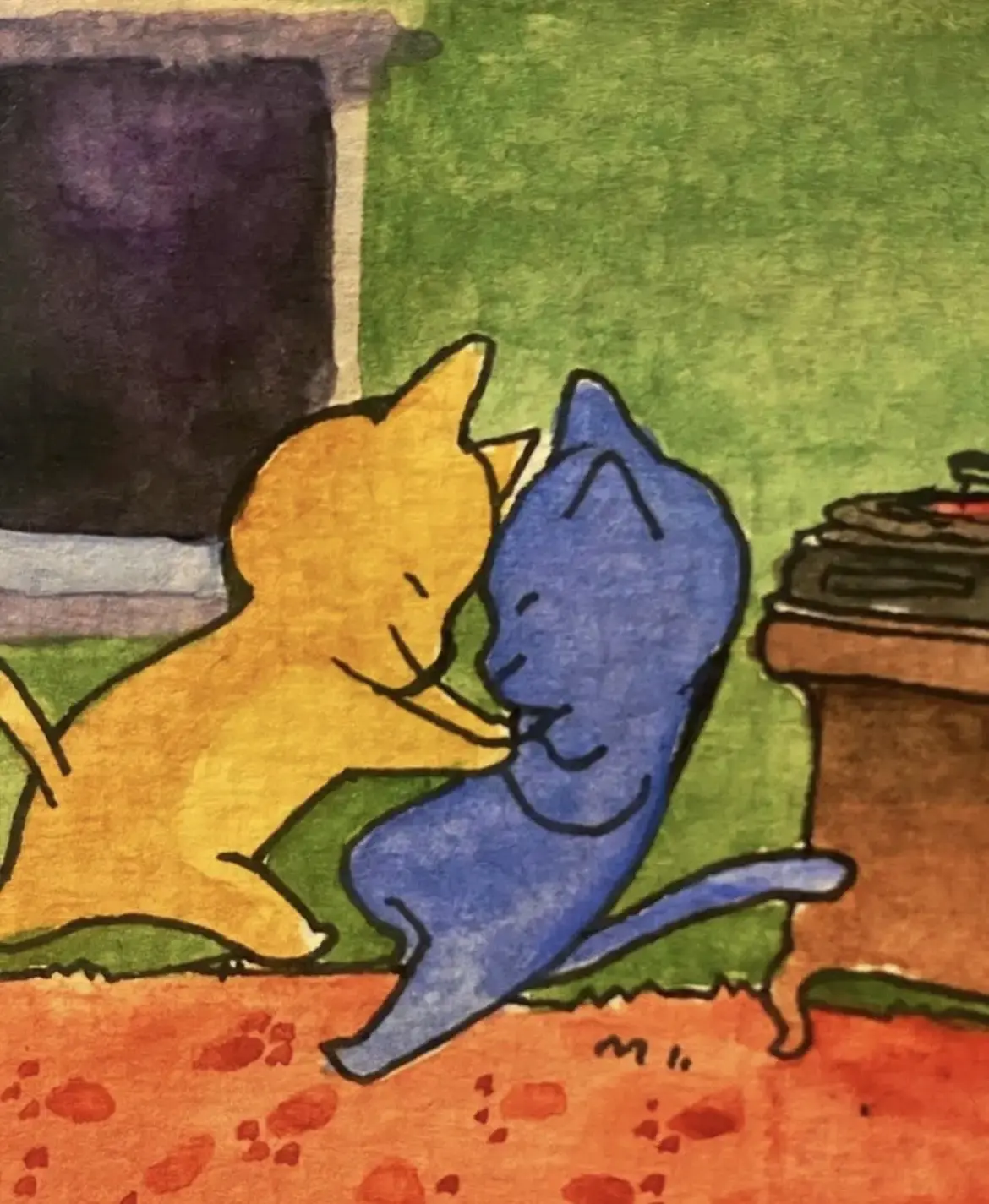I was raised in a religious household in the 90s so of course things like D&D were haram. I even went to an evangelical college (that's a whole post there), so I was never exposed to TTRPGs.
And it sucks, because from the little I know about them, I know I would have loved to play them.
But... how do they actually work? I think I have a very basic framework. I know you have one character you control/play as. You roll to... make things happen? Or they determine things that happen? I know there's a game master who doesn't just read a story out loud... they actually influence things?
I'm gonna eventually get into Disco Elysium and I feel like actually understanding TTRPGs would help. And there's a game store near me that hosts games, I'd like to show and not be a total noob.
its when i get on my hands and knees and my bf uses me as a coffee table
i assure you its a completely platonic and transactional situation. he puts his coffee on me, i get a warm thing on my back.
It is improve comedy with gambling. It is mostly played by nerds but the game is too good for them
At a basic level, it's cooperative story telling. Typically, the GM controls the environment and NPCs while the players each control a character that interact with the environment and NPCs.
This cooperative story telling at the extreme ends can be either a mechanically heavy dungeon crawl focusing on fights, or plot/dialogue heavy and (usually) mechanically light. You can emphasize player agency (sandbox) or deemphasized player agency (railroad) or anything in between.
Dice are typically used to randomize success or failure of a specific action, and to procedurally generate things (though there are ttrpgs that use things besides dice or have no randomization). Randomizing success or failure of an action is typically improved by the specific abilities of the characters or NPCs. The could include physical or mental capabilities, skills, magical powers etc.
Randomization for procedural generation isn't necessary since everything can be intentionally designed, but can be fun. You can procedurally generate combat encounters, NPCs, treasure hoards, cities etc. Really anything.
As you can tell, there's a lot of ways to play ttrpgs. Even just within d&d, I've seen a lot of variety with some groups very similar to mine, some interestingly different, and some playing in a way I would find unappealing.
Dunno if you've played video games before but most RPG games draw heavy influence from TTRPGs. You'll have a set of attributes and skills, which improve over time. You can gain unique abilities that make you more powerful.
The only difference between an rpg game like New Vegas and a TTRPG is that in the TTRPG, you have to say you want to do something, and the adjudicating player (Game Master, Dungeon Master, Keeper of Secrets, etc etc) will tell you to roll a die to see if you succeed or fail, with modifiers added to the roll based on the applicable skill or attribute.
If you want to get into TTRPGs you can straight up show up to a game night and be a total noob, because everyone to ever play was one once.
If you want to get into TTRPGs you can straight up show up to a game night and be a total noob, because everyone to ever play was one once.
This is probably the best advice. If a group isn't open to introducing new people to their hobby, they're probably not going to be people you enjoy playing with/being around.
Actually, it would probably be better to play Disco Elysium first. DE has very basic TTRPG mechanics like rolling dice, assigning character points, and inventory management. The major difference between Disco Elysium and a TTRPG is thar DE is much more rigid in the story and the actions you can take. Which might be beneficial for someone unfamiliar with RPGs, as it provides more structure than a lot of GMs might.
TTRPGs are at their core, communal storytelling. People come together to weave together a fantasy for their collective enjoyment.
There are hundreds of variations on systems, setting, etc, but what you'll see most often is the D&D-style configuration. This entails one person being the Dungeon Master (DM) who creates and describes the story content to the other people, players, who interact with that content. Players have the freedom to do as they will and their actions are resolved using some sort of random result generator, typically dice. Success of those actions is moderated by their character's statistics which are an analogue for how good their fantasy character is at doing everything from swinging a sword to smooth-talking a city guard.
Off the top of my head, play would go something like this.
DM: After about a day's journey, you encounter the mouth of a cave just as the sun begins to set. Based on the directions you were given, this is most likely the place. What do you do?
Player 1: I pull out a torch, light it, and peer inside.
DM: The soft crackling of the flame of your torch echoes off the dense stone walls of the cave as you peer inside. The darkness of the cave seems to swallow the light of your torch as you peer inside amplified only by the setting sun outside. The smell of damp, stagnant air fills your nose. You see a path leading deeper inside. What do you do?
Player 2: Well, we didn't come all this way just to turn around, right? I pull out my torch and shield and make my way into the path within.
Player 1: I'm following behind, watching our back for any surprise attacks.
DM: Very well. You walk deeper into the darkness on a claustrophobic, winding tunnel into the mountain. After a few minutes time, the tunnel opens into a large chamber, the walls of which extend beyond the light of your torches. The smell in here is different... pungent, rotten. Before you have time to get your bearings, you hear the sound of scratching on the stone floors. It's faint at first, but soon it grows into a cacophony. The glimmer of eyes begin to peer back at you from the darkness just on the edge of the light of your torches. Everybody roll for initiative.
And so on :zizek:
There's a lot more interaction than I care to type out, but that's a general idea of how most games flow. If you're genuinely curious, I'd take a few minutes and look for a D&D session on YouTube or Twitch and watch them there. Hell, there are TTRPG episodes of Chapo that are pretty hilarious of your politically brain poisoned like me.
For real the lovecraftian adventure of the wet bois in Washington is amazing
To clarify rolling to make things happen, most systems work like this: When a character tries to do something that they might fail or succeed at the player rolls a die and adds to the result a number called a modifier. The modifier represents how good the character is at the task in question. The game master then compares this result to a fixed value that represents the difficulty of the task. If you beat this value you succeed or else you fail.
The exact rules are going to vary from system to system. D&D and most similar high fantasy systems use a 20 sided die for this but there are other systems that use different dice.
You generally don’t roll to do things like traveling or resting in camp.
Yeah, it a TTRPG, not Oregon Trail. :data-laughing:
TTRPGs are adults playing pretend with the structure of a game to give it shape. Some TTRPGs have more rules and the resultant playing pretend is heavily structured, some TTRPGs have fewer rules and the resultant playing pretend is as freeform as when kids do it. I think the rules and the gamelike structure help to launder the roleplaying aspect past all of your cultural conditioning that tells you that such a thing is childish and that you shouldn't do it, so you could see them as a way to get in touch with your creativity with a group of similarly-minded people in a setting where fewer people will judge you or think you're cringe for expressing yourself honestly.
Anyway the way you do it is you gather a group of people and decide on a game, then arrange a regular meeting time (this is by far the hardest part). Once you're sitting down at a table together (or on the same VOIP call) the actual game mechanics are decided by what you're playing. Most commonly TTRPGs take the form of pulpy fantasy action where a rag tag group of heroes save the world - this gives each player the opportunity to express themselves through their character and a common goal to work towards in the game mechanics - but there's so many RPGs out there you can find a game for just about any genre of storytelling you can imagine.
So practically every major TTRPG system is sold as a series of books, and most of them will have a page or two explaining the concept of roleplaying for new players. I happen to have GURPS 4E Basic Set: Characters open and this is what it says:
In a roleplaying game (RPG), each player takes the part of a “character” participating in a fictional adventure. A referee, called the Game Master (GM), chooses the adventure. He determines the background and plays the part of the other people the characters meet during their adventure. The adventure may have a fixed objective – save the Princess, find the treasure, stop the invasion – or it may be open-ended, with the characters moving from one escapade to the next. A roleplaying “campaign” can be open-ended, lasting for years, as characters (and players) come and go. It’s all up to the GM and the players.
No game board is necessary for a roleplaying game – although some systems, including GURPS, include optional “boardgame” rules for combat situations. Instead, the game is played verbally. The GM describes the situation and tells the players what their characters see and hear. The players then describe what they are doing to meet the challenge. The GM describes the results of these actions... and so on. Depending on the situation, the GM may determine what happens arbitrarily (for the best possible story), by referring to specific game rules (to decide what is realistically possible), or by rolling dice (to give an interesting random result).
Part of the object of a roleplaying game is to have each player meet the situation as his character would. A roleplaying game can let a player take the part of a stern Japanese samurai, a medieval jester, a wise priest, a stowaway gutter kid on her first star-trip... or absolutely anyone else. In a given situation, all those characters would react differently. And that’s what roleplaying is about! Thus, good roleplaying teaches cooperation among the players, and broadens their viewpoints.
But roleplaying is not purely educational. It’s also one of the most creative possible entertainments. Most entertainment is passive: the audience just sits and watches, without taking part in the creative process. In roleplaying, the “audience” joins in the creation. The GM is the chief storyteller, but the players are responsible for portraying their characters. If they want something to happen in the story, they make it happen, because they’re in the story. Other types of media are mass-produced to please the widest possible audience, but each roleplaying adventure is an individual gem, crafted by those who take part in it. The GM provides the raw material, but the final polish comes from the players themselves.
The other important thing about roleplaying is that it doesn’t have to be competitive. In most roleplaying situations, the party will succeed or fail as a group, depending on how well they cooperate. The greatest rewards of good roleplaying come not in “winning,” but in character development. The more successfully a player portrays his character (as judged by the GM), the more that character will gain in ability.
When it’s all said and done, the GM and the players will have created a story... the story of how the characters met, learned to work together, encountered a challenge, and (we hope) triumphed!
You sit down at a table with a bunch of other people and tell a story, either with one storyteller or collaboratively. Usually everyone (except the storyteller when there is a storyteller) has a character that they are controlling and make decisions for. When there's drama or whatever the players get to make decisions about what their characters do. When there's a chance that their characters might fail you roll dice to find out whether they succeed or fail based on a giant reference book full of rules.
Some games are more focused on fighting monsters or cops. Some games are more focused on social intrigue and drama.
It's a cross between a board game and improv, with different tables emphasizing different aspects. Each player controls a character, and when they want to do something, the game master can tell them if it's trivial or if it's impossible, but for important actions where there a chance of failure, the game master can ask them to roll a die to see if they succeed, and then describes what happens as a result.
The game master and the players tell the story collectively. Some game masters come up with a structured plotline that they expect the players to go along with, while others act more as a referee and just see where the players want to go. Some stick closely to the rules while others are more flexible, some do detailed worldbuilding while others make everything up on the fly. There's also published settings and adventures that some people use, while others come up with their own.
At a game store, you're probably going to be dealing with "organized play," which is a style developed for playing with strangers, where players may drop in and out of games more often. Organized play uses published adventures, and there are some limitations, like the GM can't hand out a super powerful magic item that you could then take to another table. If someone drops out or someone new shows up, you just roll with it and don't expect an in-universe explanation. Players can't take hostile actions towards each other unless everyone agrees to it, and you're expected to cooperate and go along with the plot.
But yeah the main difference from most games is that you can do, like, anything. You can just be like, "Ok, I want to grab that ladder and hook my lantern to the end of it and swing that around to set things on fire." There's no rule that says you can do it, but it's a thing that you could plausibly do, so chances are the GM will let you do it - though they might make you roll for it, or highlight a complication, and it's probably not going to be as effective as a conventional weapon. But it really gives you an opportunity to think outside the box and solve problems creatively. And you can also be creative in who you're playing and how they think, what they look like, how they talk, and so on, it's a great opportunity to express yourself in a way you might not be able to normally.
Tbh just dive in. Everybody starts somewhere, and tabletop has been growing in popularity so there's a lot of new players. If you want, you could also watch a game online to get a feel for it.
It depends on the game, but generally your character has a set of Attributes like Strength, Dexterity, Intelligence, and so on. Those Attribute ratings often serve as modifiers to Skills, such as high Dexterity giving a bonus to Lockpicking. Some games use only Skills and no Attributes.
So, the Game Master is the leader (often with much player input) in determining how players interact with the world. Supposing that a player wants to pick a lock, the GM would establish how difficult the lock is to pick. Then the player would roll their Lockpick skill (rolling dice, plus or minus their Lockpick modifier) to find out whether they pass the threshold for successfully picking that lock.
Different games handle things very differently though. They range from extremely detail-oriented to extremely freeform









